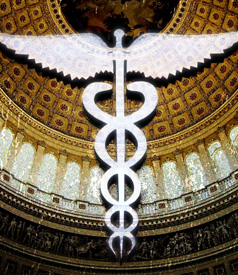Sunday 21 March 2010

(Image: Jared Rodriguez / t r u t h o u t; Adapted: o palsson, takomabibelot)
Washington - The House of Representatives late Sunday passed by a 219 to 212 vote the biggest overhaul of the nation's health care system in more than four decades, sweeping changes expected to make coverage easier and cheaper to obtain.
The largely party-line vote — 219 Democrats voted "yea," while all 178 Republicans and 34 Democrats voted no — meant President Barack Obama's biggest domestic initiative inched closer to the end of its year-long political and legislative odyssey.
The vote sent a bill passed on Dec. 24 by the Senate to Obama for his signature. The House, however, will consider later Sunday another bill that would make major changes, called reconciliation.
If that passes — and approval seems virtually assured — it would go to the Senate immediately. Should the Senate concur, probably later this week, all the health care changes would need is Obama's certain signature.
The $940 billion legislation would make the biggest health care since Medicare was created 45 years ago. Under the new plan, most consumers would be required to have coverage by 2014, and most employers would have to offer it.
Within a year, insurers would be barred from denying coverage to children because of pre-existing conditions, imposing lifetime limits on coverage and dropping people from coverage when they get sick.
The reconciliation bill makes several key changes to the Senate measure. A Medicare payroll tax would increase of 0.9 percentage points, to 2.35 percent, for earnings of more than $200,000 a year for single filers and $250,000 for joint filers. In addition, such earners would pay 3.8 percent on dividend, interest and other unearned income, starting in 2013.
The bill also provides more help with insurance premiums for lower- and middle-income consumers and expands Medicaid funding to states.
"I know that this bill is complicated," said House Majority Leader Steny Hoyer, D-Md. "It's also very simple. Illness and infirmity are universal, and we are stronger against them together than alone. Our bodies may fail us. Our neighbors don't have to."
Republicans warned the plan's impact would reverberate beyond health care policy.
In an impassioned floor speech, House Minority Leader John Boehner, R-Ohio, chastised House Democrats for ramming through a bill and suggested that the majority party will pay the price in November's midterm elections.
"We have failed to listen to America," Boehner said. "If we pass this bill, there will be no turning back. It will be the last straw for the American people. In a democracy, you can only ignore the will of the people for so long and get away with it."
The outcome was in some doubt early Sunday as about a dozen anti-abortion Democrats threatened to withhold their support unless they got guarantees that the legislation wouldn't expand the government's role in abortion. However, the White House said Sunday afternoon that Obama would issue an executive order to ensure that the administration will enforce long-standing restrictions on the use of federal funds for abortion.
Rep. Bart Stupak, D-Mich., who led the anti-abortion group, was pleased, and flatly predicted that when the House votes late Sunday, it will have the 216 needed for passage.
"We wanted to see health care reform, but there was a principle we wanted to see — the sanctity of life." Stupak said. Another group member, Rep. Nick Rahall, D-W.Va., said he now planned to cast "the most pro-life vote" in his 34-year congressional career.
The lengthy executive order, negotiated over several days, resolves several thorny problems — it removes from the legislation any changes to abortion policy, which would have required the difficult prospect of getting Senate approval. It also assures the support of the last big bloc of holdout Democrats.
Democrats picked up other key votes Sunday. Rep. Brian Baird, D-Wash., who'd voted no on the House bill in November, said he'd now vote yes. "This legislation before us in not perfect, but it does make substantial improvements on what exists today," he said.
Rep. Marcy Kaptur, D-Ohio, one of the anti-abortion Democrats on the fence, told Toledo, Ohio, said she got assurances from administration officials that current federal law on abortion would be preserved.
Democrats, though, were still having trouble convincing a lot of "Blue Dogs," or fiscal conservatives. Rep. John Tanner, D-Tenn., Sunday decided to vote "no" because "I am unconvinced the long-term trend of rising health care costs is adequately addressed."
The debate Sunday began as the Capitol buzzed with an electric atmosphere. Outside in warm early spring weather, crowds protesting the health care bill and others supporting it rallied.
"Things are colliding today," said Maria Robalino, 35, of Washington, carrying a purple "Catholics for Healthcare Reform" sign.
Inside the Capitol, the mood could be tense. Particularly after a protester jumped up during the debate and shouted "kill the bill." Police quickly pounced and escorted him out of the chamber.
The debate on the House floor was a rerun of sorts, as Republicans and Democrats took turns offering well-rehearsed talking points.
"We know a nation is truly healthy when all of its citizens can have health care," said Rep. Jay Inslee, D-Wash.
"These bills are not the answer. They compound current problems and make health care even more expensive for small businesses," argued Rep. Joe Wilson, R-S.C.
(Erika Bolstad and Les Blumenthal contributed to this article.)
All republished content that appears on Truthout has been obtained by permission or license. Let The Sun Shine In......




No comments:
Post a Comment
We post comments in English and only by followers of this blog. While anyone is free to read any of the material here, comments from self-identified, moderate to left-of-center independents are welcome to post after joining up. Others may comment by email and will occasionally be posted as well.